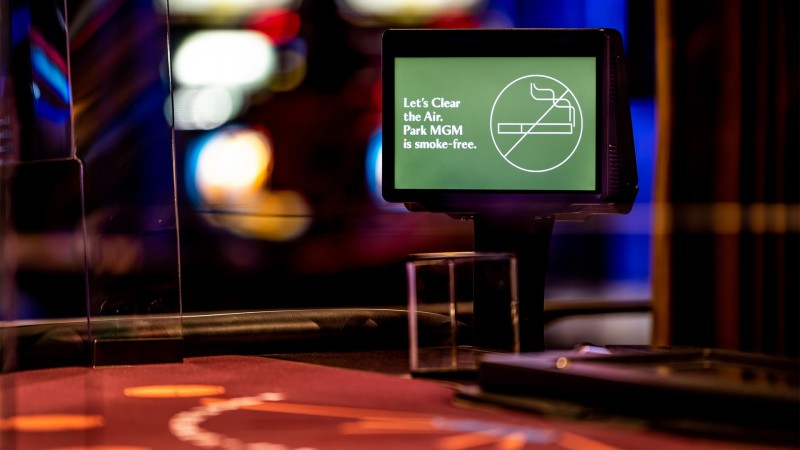As casino workers across the United States, in jurisdictions such as Rhode Island and New Jersey, call for smoking bans at their workplaces, operators and the industry argue the move would lead to potential losses in wins and job cuts. However, a new report by C3 Gaming argues smoking bans are no longer a threat to revenue.
The report, issued Friday, examines how the pandemic has affected gamblers’ behavior and habits, and how this idiosyncratic change could lead to different results in terms of revenue for properties that decide to enforce the smoking ban that many casino workers have been rooting for.
The coronavirus pandemic has changed several key aspects of the casino experience, the study by the Las Vegas-based consultancy found, including the elimination of daily housekeeping and room service in many properties, and the closing of buffets. This altered consumer expectations and behavior, and it is suggested in the report that it has paved the way for the smoking ban to be naturalized seamlessly.

The document also emphasizes that data from multiple jurisdictions shows that banning smoking is no longer an indicator of irretrievable drops in revenue, and points out that non-smoking properties appear to be performing better than their counterparts that continue to allow smoking.
“It has been a long-held belief that statewide smoking bans have an immediate negative impact on gaming revenue. This was amply demonstrated in bans implemented in Delaware, Colorado, Illinois, Deadwood SD, and New Orleans. What is rarely discussed are the other mitigating factors that contributed to those initial declines,” the report reads. “Also rarely mentioned is that, while gaming revenues declined during the first year that smoking bans were implemented, those revenues tended to recover in subsequent years.”
The report also tackles the industry belief that slot machines in smoking areas generate more money than in non-smoking areas. “Electronic gaming devices in non-smoking areas have consistently underperformed compared to machines located in smoking areas,” the report concedes. But that is not the end of the discussion.
“What is never mentioned are some of the underlying factors, including the mix of games found in non-smoking areas, their location of non-smoking areas within the casino, and their general lack of energy compared to gaming areas in the center of the casino,” the study says.
The report looks at casinos’ performance in numerous states since the coronavirus pandemic hit in early 2020, and finds that “those casinos that implemented smoking prohibitions did not experience any drop in revenues or lost market share to nearby casinos that continued to offer smoking environments.”
The report also goes over the Delaware testing of a smoking ban in November 2002, which resulted in a revenue decline of 11.3% in 2003, and saw a rise in 2004 that resumed revenue growth in subsequent years.
“Nevertheless, this became a bellwether for predicting the impact of state-mandated smoking prohibitions for the last twenty years. What is never mentioned are other economic factors that may have also impacted a drop in gaming revenue,” the report reads.
Borgata Hotel and Casino
C3 Gaming cited in its document the opening of the Borgata Hotel and Casino in Atlantic City back in 2003, which was the first true integrated resort to open in the city in over a decade. As Delaware casinos compete with Atlantic City for gamers residing in the mid-Atlantic region, “no doubt, a portion of those gamers diverted visits to play at the new property.” Global events are also rarely taken into account, such as the invasion of Iraq in 2003, which affected casinos across the US.
The authors also interviewed tribal casino executives, who said profitability was starting to increase due to lower maintenance costs, adding that 157 tribes were able to end smoking in their casinos “without economic cost”.
The report found that gamblers in several markets did not flock to smoking casinos when others in the region prohibited smoking, citing examples from Pennsylvania, Indiana and others.
It also found that casinos that offer smoking do not perform better than those that do not allow it, such as the Parx Casino in Philadelphia, Empire City in New York, Foxwoods and Mohegan Sun in Connecticut, and Resorts World in Queens. These properties have had a greater slot machine win-per-day performance than Atlantic City over the past 12 months.

Las Vegas remains the bastion of casino smoking, with only Park MGM resort banning it completely. But other states have seen venues taking the initiative, such as Rivers Casino in Philadelphia, which has been smoke-free since August 2021, when general manager Justin Moore decided it was easier operationally to remain that way rather than changing policy to comply with frequently changing pandemic mandates from the city.
The report also takes aim at a report commissioned in February by New Jersey’s casinos predicting massive revenue and job losses if a smoking ban was implemented. The stakes are high, particularly in New Jersey, where the main casino workers’ union is threatening a strike in July if new contracts providing salary adjustments are not reached.
It also comes weeks after Representative Teresa A. Tanzi joined members of the union that represent workers at Rhode Island’s casinos in calling for passage of her legislation to include casinos in the state’s law prohibiting smoking in workplaces.
Original article: https://www.yogonet.com/international/news/2022/06/21/63102-casino-smoking-bans-no-longer-a-cause-of-revenue-drop–new-report-finds














